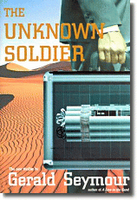 Gerald Seymour, whose novel The Unknown Soldier I praised here, named five novels that "depict terrorism with riveting authority" for Opinion Journal.
Gerald Seymour, whose novel The Unknown Soldier I praised here, named five novels that "depict terrorism with riveting authority" for Opinion Journal.Here is part of his list:
Black Sunday by Thomas Harris (Putnam, 1975)Click here to read about the remaining titles on Seymour's list.
A brilliant read, I promise it: A terrorist conspiracy targets the Super Bowl. Thomas Harris, a former AssociatedPress reporter, knows how security apparatchiks operate, but the author of "The Silence of the Lambs" (1988) also tells a hell of a good story. Thriller writers tend not to be proud; certainly they do not usually pretend to have discovered life's great truths. The story rules, and the crucial question is: "What if . . .?" In this case, it is: What if Arab terrorists so detest the U.S. that they use a blimp to try to kill the president and 80,000 football fans in New Orleans on the big day? Here's the biggest compliment on offer to a popular novelist: I couldn't put it down.
The Little Drummer Girl by John le Carré (Knopf, 1983)
The Middle East has been kind to thriller writers, probably rated second as a banker zone after the Cold War--but in the "terrorism" field, thelittle low-intensity wars of the Arabs and Israelis sit on top of the heap. Le Carré is, of course, a writer of eminence, and his foray into the world of ruthless Palestinian guerrilla leaders and hugely professional Mossad counter-terrorist officers can only be memorable. "The Little Drummer Girl," in which a young British woman is drawn into the deadly brinkmanship between the two camps, was written more than two decades ago, but with its sense of location and atmosphere it has not been bettered. Le Carré gives us not only the bones that we find in broadsheets and on newscasts but also flesh and sinew--plenty of it.
The Day of the Jackal by Frederick Forsyth (Viking, 1971)Yes, this is a terrorism story: A dissident political group in Paris in 1963 hires an amoral marksman to assassinate the French head of state, Charles de Gaulle. It didn't actually happen, of course, so before we've read the first page we know that the murder attempt will fail . . . and yet we read on. We scowl and snarl at any interruption. Forsyth changed the face of thriller writing and I believe--allow me a moment of pomposity--created the most satisfying edge-of-the-seat read of my adult life. He moved the style on. Before Forsyth, the top cats were Alistair MacLean and Ian Fleming, who peddled fine fantasies, but they were supplanted by the gritty realism of the "Jackal." Forsyth, and his story of a counter-terrorism investigation against the clock, has been much imitated but never surpassed.
--Marshal Zeringue





